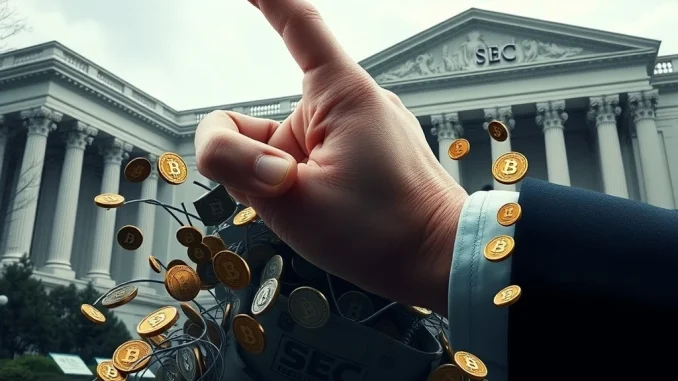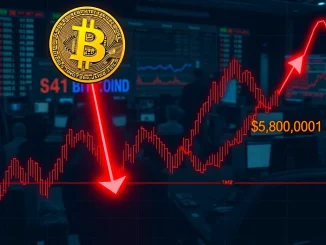
The world of digital assets is constantly evolving, and with it, the regulatory landscape. A significant development recently emerged as Citadel Securities, a major player in financial markets, has urged the U.S. Securities and Exchange Commission (SEC) to exercise caution and slow down its efforts concerning tokenized securities. This move signals a crucial debate unfolding at the intersection of traditional finance and the burgeoning crypto economy, prompting questions about investor protection and market stability.
Why is Citadel Securities Sounding the Alarm on Tokenization?
Citadel Securities, a behemoth in market-making, isn’t just making noise for the sake of it. Their recent comment letter, submitted to the SEC’s Crypto Task Force on July 21, highlights profound concerns about the rapid adoption of tokenized securities. The core of their argument revolves around the potential for investor confusion. Imagine a world where the lines between traditional securities and their tokenized counterparts become blurred without clear guidelines. This could inadvertently expose investors to risks they might not fully comprehend, especially if regulatory frameworks are relaxed.
Furthermore, Citadel points to the risk of “regulatory imbalances.” This means that if tokenized securities operate under a different, potentially lighter, regulatory burden than traditional ones, it could create an uneven playing field. This imbalance could disadvantage established exchanges and publicly traded companies, potentially leading to a race to the bottom in terms of investor safeguards. Their call for a formal rulemaking process isn’t about stifling innovation but rather ensuring that any progression in tokenization is built on a solid, legally sound foundation.
Understanding the SEC’s Approach to Tokenized Securities
The U.S. Securities and Exchange Commission (SEC) plays a pivotal role in safeguarding investors and maintaining fair, orderly, and efficient markets. Their Crypto Task Force is specifically designed to tackle the complexities of digital assets. When a firm like Citadel Securities recommends a slower, more deliberate regulatory approach to tokenized securities, it directly impacts the SEC’s strategy.
Currently, the SEC is grappling with how to classify and regulate various digital assets. Tokenization, the process of converting rights to an asset into a digital token on a blockchain, presents unique challenges. On one hand, it promises increased liquidity, fractional ownership, and enhanced transparency. On the other, it introduces new technological and legal complexities. Citadel’s recommendation for a formal rulemaking process suggests a need for comprehensive, publicly debated rules rather than ad-hoc guidance or exemptions. This would allow for broader industry input and a more robust framework, ensuring that innovation doesn’t outpace necessary investor protections.
The Broader Implications of a Cautious Regulatory Approach
A cautious regulatory approach to tokenized securities, as advocated by Citadel Securities, carries significant implications for the entire financial ecosystem. It’s not merely about slowing down; it’s about ensuring sustainable growth.
Benefits of a Measured Pace:
- Enhanced Investor Protection: Clearer rules can prevent scams and ensure investors understand the risks and rewards.
- Market Stability: A well-defined framework can reduce volatility and speculative bubbles associated with unregulated markets.
- Level Playing Field: Prevents regulatory arbitrage, ensuring all market participants adhere to similar standards.
- Legal Clarity: Provides certainty for businesses looking to innovate in the tokenization space, reducing legal risks.
Potential Challenges of Rushing:
- Regulatory Gaps: Incomplete rules can leave loopholes exploited by bad actors.
- Investor Confusion: Lack of clarity can lead to misinterpretations and poor investment decisions.
- Market Fragmentation: Different rules for similar assets can fragment markets and hinder liquidity.
- Reputational Risk: A poorly regulated market can erode public trust in digital assets.
The call for formal rulemaking is crucial because it allows for extensive public commentary, expert analysis, and a transparent process to develop regulations that truly fit the evolving nature of digital assets, rather than trying to force them into existing, potentially ill-fitting, frameworks.
What Does This Mean for the Crypto Task Force and Future Regulations?
The Crypto Task Force at the SEC is at the forefront of shaping the future of digital asset regulation in the U.S. Citadel Securities’ intervention underscores the importance of industry feedback in this critical process. This isn’t just one firm’s opinion; it represents a significant voice from traditional finance expressing concerns that resonate with the SEC’s core mission of investor protection.
The task force will likely consider such detailed input as it navigates the complex landscape of digital assets. While the push for innovation is strong, the SEC’s mandate requires a careful balance between fostering new technologies and preventing harm. A formal rulemaking process, as suggested, would involve:
- Proposal Publication: The SEC publishes proposed rules for public comment.
- Public Comment Period: Stakeholders, including firms, academics, and the public, submit feedback.
- Review and Revision: The SEC reviews comments and revises the proposed rules.
- Final Rule Adoption: The SEC adopts the final rules, which then become legally binding.
This structured approach ensures that any regulations governing tokenized securities are robust, well-considered, and capable of addressing the unique characteristics of blockchain technology while upholding long-standing principles of securities law. This proactive engagement from major market participants like Citadel Securities is vital for developing a mature and secure digital asset ecosystem.
Actionable Insights for the Crypto Community:
- Stay Informed: Keep a close eye on SEC announcements and public comment periods. Your voice matters.
- Understand the Nuances: Differentiate between various types of digital assets and their potential regulatory classifications.
- Prepare for Scrutiny: Projects involved in tokenizing traditional assets should anticipate rigorous regulatory oversight.
- Advocate for Clarity: Support initiatives that push for clear, comprehensive, and balanced regulations.
Summary
Citadel Securities has delivered a potent message to the U.S. SEC, urging a more deliberate and cautious regulatory approach to tokenized securities. Their concerns about potential investor confusion and market imbalances highlight the complexities of integrating innovative blockchain technology with established financial frameworks. This call for a formal rulemaking process, rather than relaxed rules, signals a pivotal moment for the Crypto Task Force and the broader digital asset landscape. Ultimately, ensuring robust investor protection and a level playing field remains paramount as the world moves towards a more tokenized future. This measured approach, while potentially slower, could lay the groundwork for a more stable and trustworthy digital asset market.
Frequently Asked Questions (FAQs)
Q1: What are tokenized securities?
A1: Tokenized securities are traditional financial assets (like stocks, bonds, or real estate) whose ownership or rights are represented by digital tokens on a blockchain. This process, called tokenization, aims to increase liquidity, enable fractional ownership, and streamline transactions.
Q2: Why is Citadel Securities concerned about tokenization?
A2: Citadel Securities is concerned that relaxing traditional securities regulations for tokenized assets could lead to investor confusion, create regulatory imbalances between traditional and tokenized markets, and potentially expose investors to unforeseen risks. They advocate for a more formal and cautious approach.
Q3: What is the SEC’s Crypto Task Force?
A3: The SEC’s Crypto Task Force is a specialized unit within the U.S. Securities and Exchange Commission dedicated to addressing issues related to digital assets, including cryptocurrencies, blockchain technology, and tokenized securities. Its goal is to develop appropriate regulatory responses to this evolving sector.
Q4: What does “formal rulemaking process” mean in this context?
A4: A formal rulemaking process involves the SEC proposing new rules, publishing them for public comment, reviewing feedback, and then adopting final, legally binding regulations. This transparent and deliberative process ensures comprehensive consideration of all viewpoints and potential impacts.
Q5: How might this impact the future of digital assets?
A5: Citadel’s stance and the SEC’s response could lead to a more structured and potentially slower, but ultimately more secure, integration of tokenized assets into mainstream finance. It emphasizes the need for clear regulatory frameworks that protect investors while still allowing for innovation.



